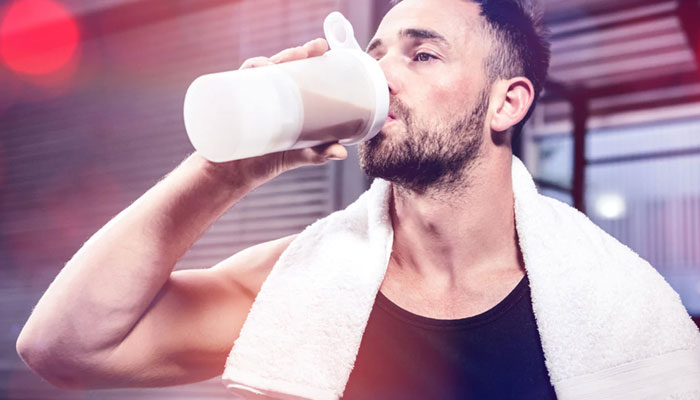
Proteins are the primary building blocks of muscle tissue. Building muscle mass increases a person’s resting metabolic rate, which helps burn more calories.
Nine amino acids are essential, meaning they cannot be made by the body and must be obtained from dietary sources. These include threonine, isoleucine, valine, leucine, lysine, and methionine.
Eggs
Ever since Rocky gulped down raw eggs to build muscle in the ’70s, many people have opted for egg whites as their protein source. While they contain plenty of high-quality protein, removing the yolk (where all that fat resides) means you’re missing out on important vitamins and minerals, including Vitamin D, calcium, iron, choline, and potassium (1).
Guoda Karoblyte, who has a degree in food and human nutrition and runs the “Metabolic Kitchen” Instagram account, recommends eating whole eggs for muscle growth because they provide both protein and fat-burning omega-3 fatty acids. She says whole eggs also boost levels of choline and antioxidants zeaxanthin and lutein, which can prevent eye diseases (2).
Protein consists of amino acids, and the body needs all 20 of them to grow and repair muscle tissue. Some proteins, called complete proteins, contain all nine essential amino acids; animal foods like eggs and meat are complete proteins; plant-based proteins, such as quinoa, beans, and hemp seeds, are incomplete (3).
The researchers who conducted the recent study found that when healthy, young men consumed three raw eggs or an equivalent amount of egg whites after a workout, their muscles produced more protein fibers than when they consumed the egg whites alone (4). They speculate that the response may be because the whole egg contains a combination of amino acids that work together to stimulate protein fiber repair and synthesis.
Chicken
Chicken is a protein-packed food that can help you build muscle. Each 3-ounce serving provides about 26.7 grams of high-quality protein (4). It also contains some important B vitamins, including niacin and vitamin B6 (5).
Proteins are made of chains of amino acids, and they perform many vital functions in your body. Some amino acids are essential – your body cannot produce them, so you must get them from your diet. Other amino acids are nonessential – your body can make them, so they don’t need to be included in your diet. You can find amino acids in foods like meat, fish, and dairy products, as well as some plant proteins such as soy, quinoa, and buckwheat. Don’t forget to explore Food & Drinks Discounts for potential savings when purchasing protein-rich foods.
The best protein source for building muscle is animal protein, such as beef, poultry, and eggs. These contain all nine of the essential amino acids, which are the building blocks of proteins. A protein that contains all the essential amino acids is called a complete protein. Dairy products, such as milk, yogurt, and cheese, are also considered complete proteins. They contain both the fast-digesting whey and slow-digesting casein proteins, which are both essential to muscle growth. They also provide a good amount of the nonessential amino acid cysteine, which helps with protein synthesis and repair.
Fish
Fish is a healthy source of protein and fatty acids, as well as zinc, iron, and vitamin B12. In addition to being high in protein, fish contains omega-3 fatty acids, such as alpha-linolenic acid (ALA) and its metabolites, docosahexaenoic acid (DHA) and eicosapentaenoic acid (EPA). These fats are necessary for brain function, heart health, and muscle growth.
Salmon, trout, herring, mackerel, and tuna are rich sources of these fatty acids. They also contain a variety of other nutrients, including selenium and potassium, which help support muscle contraction and regulate blood pressure.
A protein-rich diet is vital for building muscle and burning fat. Protein is made up of amino acids, organic compounds that play important roles in many functions, such as building muscle and hormone production. Amino acids are categorized as essential, conditionally essential, and nonessential depending on their role in the body.
Fish is an excellent source of essential amino acids, especially lysine and glutamine. People who consume a vegetarian or vegan diet need to make sure they have adequate amounts of these amino acids because plant proteins are generally considered ‘incomplete’ proteins and do not include all of the necessary amino acids. Fish oil supplements can help fill this gap.
Beef
When it comes to muscle-building proteins, nothing compares to beef. Legendary ancient Greek wrestler Milo of Croton was said to consume 20 pounds of meat a day, but even a 4 to 5-ounce cut of lean red meat is loaded with the muscle-building nutrients you need. It contains large doses of essential amino acids, particularly arginine, cysteine, and methionine. It also delivers iron – a key factor in combating ordinary fatigue and stimulating muscle cell growth. And it contains creatine, a compound that saturates muscles with energy and promotes protein synthesis to boost muscle growth.
Other meat sources rich in protein include lamb, pork, and veal. Red meat also contains branched-chain amino acids – valine, isoleucine, and leucine – which supply energy during workouts and stimulate muscle growth. In addition, it provides the body with valuable B vitamins, such as niacin, riboflavin, and vitamin B-12, which support healthy blood. The protein foods group also includes fish, poultry, beans and peas, eggs, dairy products, soy products, quinoa, buckwheat, and vegetable sources such as broccoli and spinach. Don’t forget to explore Valley Food Storage Promo for potential savings when purchasing protein-rich foods.
Lean Meat
The body requires lean meats to supply the amino acids that help promote muscle growth. This type of protein can also regulate insulin to prevent fat storage. However, it’s important to eat the right amount of protein as too much can cause excess weight gain and burden the kidneys.
When it comes to lean meats, experts recommend choosing those that are low in fat and saturated fat. The best choices include skinless chicken, turkey, pork, and beef. Grass-fed beef is a healthier option because it contains conjugated linoleic acid, which can boost muscle growth.
Ground turkey is another great source of lean protein. This versatile meat can be used in burgers, chili, tacos, and lasagna. It’s also a good choice for those who are sensitive to gluten, as it doesn’t contain any wheat products. Canned light tuna is another great option because it’s packed with protein and has omega-3 fatty acids. It can be included in soups, salads, and sandwiches. It’s also a good source of vitamin B6, which helps the body break down carbohydrates and fats. This nutrient also aids in cell production and blood sugar regulation. It can also reduce the risk of heart disease and high cholesterol levels.
Nuts
Nuts are a protein powerhouse and an excellent addition to the muscle-building diet. Almonds, for example, offer a whopping 6 grams of protein in a quarter-cup serving. Almonds also contain omega-3 fatty acids, which are known to reduce inflammation and help prevent heart disease.
The fats in nuts are mainly unsaturated, which is a healthier form of fat. They are high in vitamin E, b vitamins, and minerals like magnesium, potassium, iron, zinc, selenium, and phosphorous. The amino acid arginine is also found in nuts, and it helps relax blood vessels so that blood can flow more freely, which helps improve oxygen to the muscles.
Adding nuts to the diet is not only good for muscle-building, but it can also help reduce belly fat. However, it is important to watch portion sizes as nuts are high in calories. A serving size is around 30g of nuts, so you need to limit your consumption.
The bottom line is that it’s best to consume a variety of proteins throughout the day to get all the essential amino acids you need to build muscle and burn fat. A balanced diet containing these essential protein foods is the most effective way to achieve your fitness goals.
Vegetables
A staple of a healthy diet, green vegetables, such as spinach, kale, and chard, are packed with fiber and low in calories, making them ideal for bodybuilding. Their high water content also helps to fill you up without adding extra fat. The vitamins and minerals found in these vegetables are vital for muscle development, fat loss, immune function, blood sugar regulation, and cell repair.
Vegetables are also a great source of leucine, a key amino acid that stimulates protein synthesis. Leucine can also help you burn fat by helping to activate your body’s fat-burning hormones.
Other vegetables, like asparagus, contain a compound called asparagine that works to directly break down fat cells. It is recommended that you eat these veggies as often as possible to support your fat-burning goals.
Proteins that provide all nine essential amino acids are known as complete proteins. Most animal products are complete, but beans, legumes, whole grains, soy products, and some seeds and nuts are considered to be ‘incomplete’ proteins. You must eat a variety of proteins from the different food groups within a day to ensure that you get all of the essential amino acids your body needs to build and maintain muscle.
Conclusion
Incorporating these top essential proteins into your diet can help you build muscle and burn fat effectively. Whether you prefer plant-based or animal-based sources, there are plenty of options to choose from. Remember to combine your protein intake with regular exercise and a balanced diet for maximum results. With dedication and consistency, you can achieve your fitness goals and improve your overall health.








